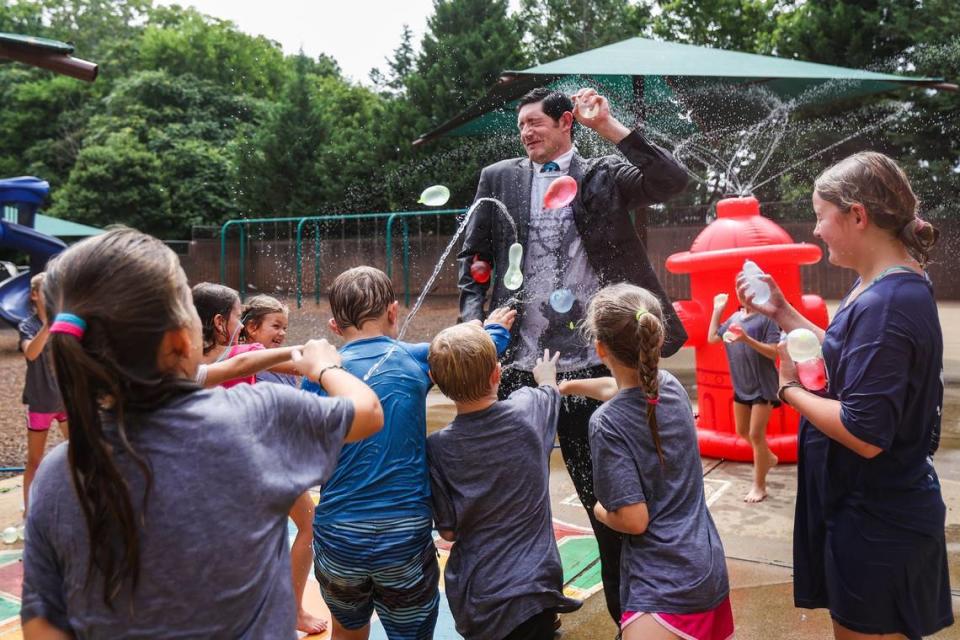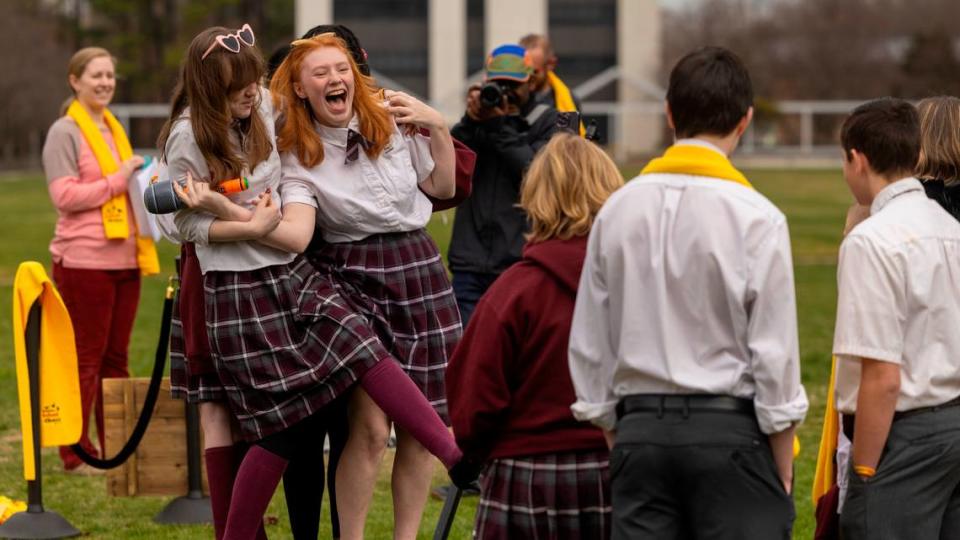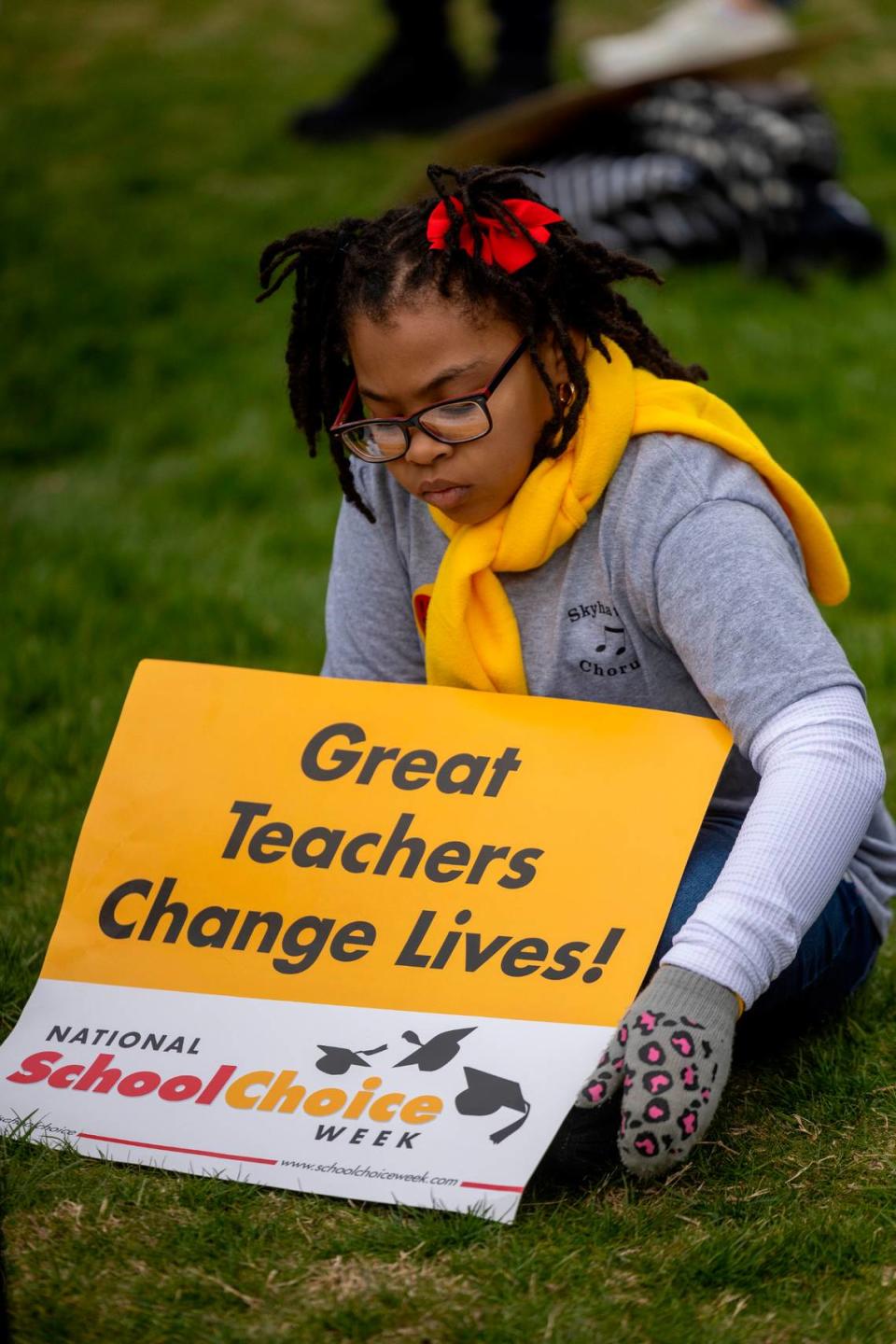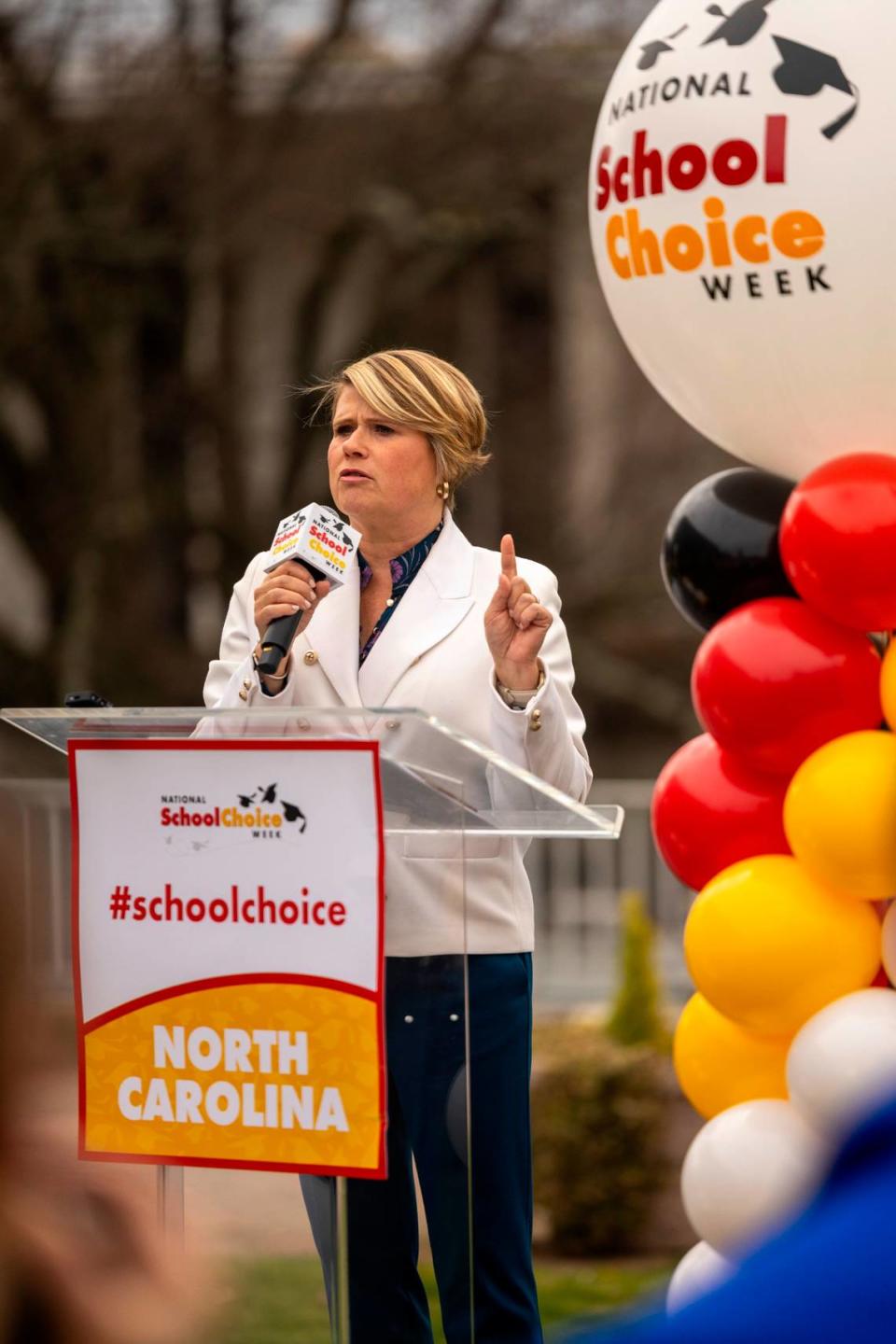A ‘history changing’ moment in NC education as universal private school vouchers arrive
North Carolina is about to see record expansion in the number of students who get taxpayer funded vouchers to attend private schools.
For the first time in the state’s history, any family can apply for an Opportunity Scholarship to cover K-12 private school costs, regardless of their income. The initial response has been large, with more than 31,600 completed applications received during the first five days of filing.
The application period runs to March 1.
The new rules could lead to a 60% increase this year in the number of students getting a voucher. And that number will only continue to rise as state lawmakers plan to spend $4.7 billion on vouchers over the next decade.
“Historic expansion of the Opportunity Scholarship Program will lead to historic application numbers this year; I have no doubt,” Mike Long, president of Parents For Educational Freedom in North Carolina, said in a statement.
“Since the program was created, we have only seen OSP enrollment numbers rise, as has demand for the scholarship, because families across our state deserve to have that choice in their child’s education.”
But it’s not a cause for celebration for public school supporters. They see state lawmakers expanding voucher funding by $1.7 billion over the next nine years at a time when public schools say they don’t get enough help.
“We could be putting that $1.7 billion into our public schools that provide choice to families,” Mary Ann Wolf, president of the Public School Forum of North Carolina, said in an interview. “Instead that money is being redistributed and put into private schools that don’t have accountability.”

Most voucher students attend religious schools
State lawmakers created the Opportunity Scholarship Program in 2013, originally promoting it as a way to help low-income families escape failing public schools. Income limits have steadily been raised to allow middle-income families to get vouchers.
This school year, more than 32,000 scholarships have been awarded so far.
Most voucher students are attending religious schools. Sixteen Protestant Christian schools and one Islamic school received more than $1 million in voucher funding last school year.
Citing federal privacy laws, the North Carolina State Education Assistance Authority is no longer listing online how many students are receiving Opportunity Scholarships at each school. The agency now only lists online the dollar amount paid to each school.
Last year, the N.C. Justice Center released a report listing instances when private schools appeared to receive more vouchers from the Opportunity Scholarship Program than for students they reported having.
“Private schools don’t have to accept all students and can set their own admissions polices on who they want to accept,” Wolf said. “They can discriminate in terms of what families attend based on religion and other factors. That’s a significant difference where our public dollars are going.”
You’ve got a NC private school voucher. Will that be enough to pay for tuition?

‘Priceless’ education for some families
Unlike many Protestant schools, Catholic schools don’t require students to be members of their faith. But Catholic families do pay a lower tuition rate.
The Roman Catholic Diocese of Raleigh has 1,261 Opportunity Scholarship students among the 9,563 students in its schools.
An Opportunity Scholarship allowed Christina and Joe Copersito to afford the $7,722 tuition at St. Mary Magdalene Catholic School in Apex. They say their daughter Amelia, a first-grade student, is thriving there.
“As someone who attended both public and private schools throughout my lifetime, I can definitely tell the difference knowing that our child is getting a Catholic education,” Christina Copersito said in an interview. “That is beyond priceless, and that should be available to everyone, every religion, every ethnicity on this Earth without having their financial status being the decider.”’

It’s why Mary Jawabreh hopes to get an Opportunity Scholarship to send her two children this fall to St. Mary Magdalene. Jawabreh said her husband is unemployed so they can’t afford the tuition based only on her salary as a charter school assistant principal.
“It would be life-changing for our kids,” Jawabreh said in an interview. “They’d have smaller class sizes. They’d have their friends from parish athletics and from church activities.”
Anyone can seek a voucher now
The rules on getting a voucher are getting a major overhaul for the 2024-25 school year.
Instead of an income limit like in the past, a family’s income will now only determine whether families will get a scholarship of between $3,360 and $7,468 per child.
The state will also no longer require any voucher students to have previously attended a public school.
“We may see a larger number of older students coming in and, as the income guidelines change as well, really opening up to what ... would otherwise have prevented our middle class families from having the Opportunity Scholarship,” Peggy Lane, the principal of St. Mary Magdalene, said in an interview.
Parents for Educational Freedom in North Carolina, which is being paid by the state to promote the voucher program to parents, estimates 15,000 to 20,000 additional families could receive an Opportunity Scholarship this year.
“Schools that are participating are encouraging more current families to apply for the funds,” Stephanie Keaney, executive director of the North Carolina Association of Independent Schools, said in an interview. “We don’t know how many of those 15,000 new students are currently enrolled in private schools and how many will be transitioning to private schools.”

A subsidy for wealthy private school families?
North Carolina is among only 10 states that offer near or total universal private school voucher access, so the track record is limited.
But in Arizona, that state’s department of education reported that more than half of the voucher recipients hadn’t attended a public school before.
Voucher critics expect families who are already attending private schools to be mainly getting the new vouchers in North Carolina. It’s led to the cry that millionaires can now get a voucher from the state.
“We were sold a bill of goods that this would help the poorest families, but that’s not how the reality is bearing out,” Todd Warren, state campaign strategist for Down Home North Carolina, said in an interview. “This is a savings account for wealthy private school families.”
But Robert Enlow, president of the group EdChoice, said North Carolina could be closer to the experience of New Hampshire, where he said only 29% of applicants after school choice expansion were existing private school families.
Even if a wealthy family receives a private school voucher, Enlow said that shouldn’t matter since the parents are already paying taxes to support public schools.
“Are we funding wealthy families who are already attending private schools?” Enlow said in an interview. “My response is we should fund families to do what’s right for their families regardless of their income status.”
Private schools raise tuition
Private schools across the state are raising tuition and sending information to families about applying for Opportunity Scholarships. How much of the tuition increase is due to inflation or to take advantage of additional voucher funding is unclear.
“Across the general economy, the increases in expenses such as utilities and supports for our students does affect our tuition,” Anna Bragg, the director of marking and enrollment management for the Roman Catholic Diocese of Raleigh schools, said in an interview.
“Additionally, we look forward to ensuring equitable salaries for our teachers, and the additional funding provided by the Opportunity Scholarship expansion will be able to assist those schools with meeting those needs.”
The tuition rate increases for some schools across the state is more than 10%, which is well above the rate of inflation.
For instance, LifeSpring Academy in Clayton is raising its tuition for the 2024-25 school year to $6,504 — an increase ranging from 17% for high school students to 29% for elementary school students. The school received $577,918 in voucher funding last school year and $$634,143 so far this school year.
LifeSpring did not return a call from The News & Observer requesting comment on the tuition increase.
Thales Academy is raising its kindergarten tuition by 14% to $6,500 at several of its schools. Thales is also citing the Opportunity Scholarship becoming available for all students for why it’s eliminating tuition discounts.
“Thales Academy offers one of the lowest tuition rates for high-quality K–12 education in North Carolina,” Kelly Ellis, a Thales spokesperson, said in a statement. “Tuition increases vary and are due to inflation, to support teacher salaries and operational costs that have risen over the past few years.”
‘History changing’ before our eyes
Voucher supporters celebrated the program expansion during National School Choice Week in January. Rep. Donnie Loftis, a Gaston County Republican who sponsored legislation to expand the program, told attendees at a rally in Raleigh that “it’s amazing to watch history changing right before your eyes.”
“The House has worked very hard in making sure we had funding lined up,” Loftis told the crowd on Halifax Mall in front of the Legislative Building. “Now we need your help to make sure more parents know there’s opportunities out there.”
Loftis was joined by speakers such as Senate leader Phil Berger, who thanked parents for sending their children to a private school supported by the Opportunity Scholarship Program.
“We know that education is not a one-size-fits-all proposition,” Berger said. “It would be a disservice to parents if we did not provide them the educational freedom to choose a school that best fits their child’s education needs.”

Public schools vs. private schools
Democratic Gov. Roy Cooper tried to put more of the focus on public schools during National School Choice Week by issuing a proclamation declaring 2024 as “The Year of Public Schools.”
During the announcement, Cooper called for a “stop to state spending on vouchers for unaccountable and unregulated private schools until North Carolina’s public schools are fully funded.”
Cooper’s Office of State Budget and Management issued an analysis last year saying expansion of the Opportunity Scholarship program could cost public schools more than $200 million a year from lost enrollment. The analysis found that poor rural school districts could be the most impacted.
The voucher expansion comes at a time when North Carolina ranks near the bottom nationally in areas such as pay for beginning teachers and per-pupil funding. At the same time, GOP lawmakers are appealing a 2022 State Supreme Court decision that the courts can order an increase in funding for public schools.
“When the most wealthy take resources out of public schools to only benefit their children, that leaves the most marginalized students — the poorest students who are disproportionately students of color — trapped in underfunded schools that harm the state,” said Warren of Down Home North Carolina.
But Catherine Truitt, the Republican state superintendent of public instruction, said a “public schools only” focus pits schools against the people they’re meant to serve.
“The more I hear the cries for investing in public schools, the more convinced I am that what the real cry should be is invest in students,” Truitt said at the Jan. 24 school choice rally in Raleigh.


